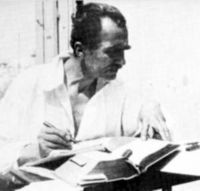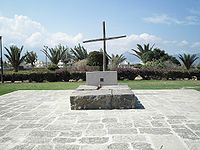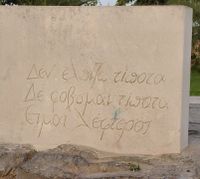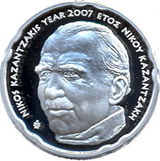Nikos Kazantzakis
| Nikos Kazantzakis | |
|---|---|
 |
|
| Born | February 18, 1883 Heraklion, Crete |
| Died | October 26, 1957 (aged 74) Freiburg, Germany |
| Occupation | poet, novelist, essayist, philosopher, playwright, travel writer |
| Nationality | Greek |
Nikos Kazantzakis (Greek: Νίκος Καζαντζάκης) (February 18, 1883, Heraklion, Crete, Ottoman Empire - October 26, 1957, Freiburg, Germany) was arguably the most important and most translated Greek writer and philosopher of the 20th century. Yet he did not become well known globally until the 1964 release of the Michael Cacoyannis film Zorba the Greek, based on Kazantzakis' novel whose English translation has the same title.
Contents |
Biography
When Kazantzakis was born, Crete was still under the rule of the Ottoman empire. His surname, Kazantzakis, derives from a Turkish word Kazancı as in Kazantzidis. Kazan means a cauldron in Turkish and -cı is an agent suffix similar to "-er" in English. Thus, Kazancı means someone who produces, repairs, and/or sells cauldrons. Crete had experienced uprisings for its independence and the ability to unite with Greece.
From 1902 Kazantzakis studied law at the University of Athens, then went to Paris in 1907 to study philosophy. Here he fell under the influence of Henri Bergson.
Upon his return to Greece, he began translating works of philosophy. In 1914 he met Angelos Sikelianos. Together they travelled for two years in places where Greek Orthodox Christian culture flourished, largely influenced by the enthusiastic nationalism of Sikelianos.

Kazantzakis married Galatea Alexiou in 1911; they divorced in 1926. He married Eleni Samiou in 1945. Between 1922 and his death in 1957, he sojourned in Paris and Berlin (from 1922 to 1924), Italy, Russia (in 1925), Spain (in 1932), and then later in Cyprus, Aegina, Egypt, Mount Sinai, Czechoslovakia, Nice (he later bought a villa in nearby Antibes, in the Old Town section near the famed seawall), China, and Japan.
While in Berlin, where the political situation was explosive, Kazantzakis discovered communism and became an admirer of Lenin. He never became a consistent communist, but visited the Soviet Union and stayed with the Left Opposition politician and writer Victor Serge. He witnessed the rise of Joseph Stalin, and became disillusioned with Soviet-style communism. Around this time, his earlier nationalist beliefs were gradually replaced by a more universal ideology.
In 1945, he became the leader of a small party on the noncommunist left, and entered the Greek government as Minister without Portfolio. He resigned this post the following year.
In 1946, The Society of Greek Writers recommended that Kazantzakis and Angelos Sikelianos be awarded the Nobel Prize for Literature. In 1957, he lost the Prize to Albert Camus by one vote. Camus later said that Kazantzakis deserved the honour "a hundred times more" than himself.
Late in 1957, even though suffering from leukemia, he set out on one last trip to China and Japan. Falling ill on his return flight, he was transferred to Freiburg, Germany, where he died. He is buried on the wall surrounding the city of Heraklion, because the Orthodox Church ruled out his being buried in a cemetery. His epitaph reads "I hope for nothing. I fear nothing. I am free." (Δεν ελπίζω τίποτα. Δε φοβάμαι τίποτα. Είμαι λέφτερος.)
Literary work
His first work was the 1906 narrative Serpent and Lily (Όφις και Κρίνο), which he signed with the pen name Karma Nirvami. In 1909, Kazantzakis wrote a one-act play titled Comedy, which remarkably resonates existential themes that become prevalent much later in Post-World War II Europe by writers like Sartre and Camus. In 1910, after his studies in Paris, he wrote a tragedy "The Master Builder" (Ο Πρωτομάστορας), based on a popular Greek folkloric myth.
Kazantzakis considered his huge epic poem (33,333 verses long) The Odyssey: A Modern Sequel to be his most important work. Begun in 1924, he rewrote it seven times before publishing it in 1938. According to another Greek author, Pantelis Prevelakis, "it has been a superhuman effort to record his immense spiritual experience." Following the structure of Homer's Odyssey, it is divided into 24 rhapsodies.
His most famous novels include Zorba the Greek (1946) (in Greek Βίος και Πολιτεία του Αλέξη Ζορμπά); The Greek Passion (1948) (UK title Christ Recrucified) (Greek: Ο Χριστός Ξανασταυρώνεται); Captain Michalis (1950) (UK title Freedom and Death)(Greek: Καπετάν Μιχάλης); The Last Temptation of Christ (1951) (Greek: Ο Τελευταίος Πειρασμός); and Saint Francis (1956) (UK title God's Pauper: St. Francis of Assisi) (Greek: Ο Φτωχούλης του Θεού). Report to Greco (1961) (Greek: Αναφορά στον Γκρέκο), containing both autobiographical and fictional elements, summed up his philosophy as the "Cretan Glance."
From youth on, Kazantzakis was spiritually restless. Tortured by metaphysical and existential concerns, he sought relief in knowledge, in travelling, in contact with a diverse set of people, in every kind of experience. The influence of Friedrich Nietzsche on his work is evident, especially Nietzsche's atheism and sympathy for the superman (Übermensch) concept. However, spiritual concerns also haunted him. To attain a union with God, Kazantzakis entered a monastery for a brief stay of six months.
In 1927 Kazantzakis published in Greek his "Spiritual Exercises" (Greek: "Ασκητική"), which he had composed in Berlin in 1923. The book was translated into English and published in 1960 with the title The Saviors of God.
The figure of Jesus was ever present in his thoughts, from his youth to his last years. The Christ of The Last Temptation of Christ shares Katzantzakis' anguished metaphysical and existential concerns, seeking answers to haunting questions and often torn between his sense of duty and mission, on one side, and his own human needs to enjoy life, to love and to be loved, and to have a family. A tragic figure who at the end sacrifices his own human hopes for a wider cause, Kazantzakis' Christ is not an infallible, passionless deity but rather a passionate and emotional human being who has been assigned a mission, with a meaning that he is struggling to understand and that often requires him to face his conscience and his emotions, and ultimately to sacrifice his own life for its fulfilment. He is subject to doubts, fears and even guilt. In the end he is the Son of Man, a man whose internal struggle represents that of humanity.
Many Greek religious conservatives condemned Kazantzakis' work. His interesting reply was: "You gave me a curse, Holy fathers, I give you a blessing: may your conscience be as clear as mine and may you be as moral and religious as I" before the Greek Orthodox church excommunicated him in 1955. (Greek: "Μου δώσατε μια κατάρα, Άγιοι πατέρες, σας δίνω κι εγώ μια ευχή: Σας εύχομαι να ‘ναι η συνείδηση σας τόσο καθαρή, όσο είναι η δική μου και να ‘στε τόσο ηθικοί και θρήσκοι όσο είμαι εγώ").
The Last Temptation was included by the Roman Catholic Church in the Index of Prohibited Books. Kazantzakis' reaction was to send a telegram to the Vatican quoting the Christian writer Tertullian: Ad tuum, Domine, tribunal appello (English: "I lodge my appeal at your tribunal, Lord", Greek: "Στο δικαστήριό σου ασκώ έφεση, ω Kύριε"). Many cinemas banned the Martin Scorsese film, which was released in 1988 and based on this novel.
In Kazantzakis' day, the international market for material published in modern Greek was quite small. Kazantzakis also wrote in modern (demotic) Greek, with traces of Cretan dialect, which made his writings all the more controversial in conservative literary circles at home. Translations of his books into other European languages did not appear until his old age. Hence he found it difficult to earn a living by writing, which led him to write a great deal, including a large number of translations from French, German, and English, and curiosities such as French fiction and Greek primary school texts, mainly because he needed the money. Some of this "popular" writing was nevertheless distinguished, such as his books based on his extensive travels, which appeared in the series "Travelling" (Ταξιδεύοντας) which he founded. These books on Greece, Italy, Egypt, Sinai, Cyprus, Spain, Russia, Japan, China, and England were masterpieces of Greek travel literature.
Quotations

Epitaph on the tomb of Nikos Kazantzakis in Heraklion:
- Δεν ελπίζω τίποτα. Δε φοβούμαι τίποτα. Είμαι λεύτερος.
- I hope for nothing. I fear nothing. I am free.
From The Saviors of God (1927; English 1960):
- We have seen the highest circle of spiraling powers. We have
- named this circle God. We might have given it any other name
- we wished: Abyss, Mystery, Absolute Darkness, Absolute Light,
- Matter, Spirit, Ultimate Hope, Ultimate Despair, Silence.
- We come from a dark abyss, we end in a dark abyss, and we call the luminous interval life.
The introductory paragraph from "The Saviors of God" or "Salvatores Dei" (Greek: "Ασκητική"). Also used as a dialogue in the movie "Zorba the Greek", Zorba to the Boss, also used as dialogue in Patch Adams:
- A man needs a little madness, or else he never dares cut the rope and be free.
Bibliography of English translations
Poetry:
Translations of The Odyssey: A Modern Sequel, in whole or in part:
- The Odyssey [Selections from], partial translation in prose by Kimon Friar, Wake 12 (1953), pp. 58-65.
- The Odyssey, excerpt translated by Kimon Friar, "Chicago Review" 8, No. 2 (Spring/Summer 1954), pp. 12-18.
- The Return of Odysseus, partial translation by Kimon Friar, "The Atlantic Monthly" 195, No. 6 (June 1955), pp. 110-112.
- The Odyssey: A Modern Sequel, a full verse-translation by Kimon Friar, New York: Simon and Schuster, 1958; London: Secker and Warburg, 1958.
- Death, the Ant, from The Odyssey: A Modern Sequel, Book XV, 829-63, translated by Kimon Friar, "The Charioteer", No. 1 (Summer 1960), p. 39.
Travel books:
- Spain, translated by Amy Mims, New York: Simon and Schuster, 1963.
- Japan, China, translated by George C. Pappageotes, New York: Simon and Schuster, 1963; published in the United Kingdom as Travels in China & Japan, Oxford: Bruno Cassirer, 1964; London: Faber and Faber, 1964.
- England, translated by Amy Mims, New York: Simon and Schuster, 1965; Oxford, Bruno Cassirer, 1971.
- Journey to Morea, translated by F. A. Reed, New York: Simon and Schuster, 1965; published in the United Kingdom as Travels in Greece, Journey to Morea, Oxford, Bruno Cassirer, 1966.
- Journeying: Travels in Italy, Egypt, Sinai, Jerusalem and Cyprus, translated by Themi Vasils and Theodora Vasils, Boston and Toronto: Little, Brown and Company, 1975; San Francisco: Creative Arts Books Co., 1984.
- Russia, translated by A. Maskaleris and M. Antonakis, Creative Arts Books Co, 1989.
Novels:
- Zorba the Greek, translated by Carl Wildman, London, John Lehmann, 1952; New York, Simon and Schuster, 1953; Oxford, Bruno Cassirer, 1959; London & Boston: Faber and Faber, 1961 and New York: Ballantine Books, 1964.
- The Greek Passion, translated by Jonathan Griffin, New York, Simon and Schuster, 1954; New York, Ballantine Books, 1965; published in the United Kingdom as Christ Recrucified, Oxford: Bruno Cassirer, 1954; London: Faber and Faber, 1954.
- Freedom or Death, translated by Jonathan Griffin, New York: Simon and Schuster, 1954; New York: Ballantine, 1965; published in the United Kingdom as Freedom and Death, Oxford: Bruno Cassirer, 1956; London: Faber and Faber, 1956.
- The Last Temptation, translated by Peter A. Bien, New York, Simon and Schuster, 1960; New York, Bantam Books, 1961; Oxford: Bruno Cassirer, 1961; London: Faber and Faber, 1975.
- Saint Francis, translated by Peter A. Bien, New York: Simon and Schuster, 1962; published in the United Kingdom as God's Pauper: Saint Francis of Assisi, Oxford: Bruno Cassirer, 1962, 1975; London: Faber and Faber, 1975.
- The Rock Garden, translated from French (in which it was originally written) by Richard Howard, New York: Simon and Schuster, 1963.
- The Fratricides, translated by Athena Gianakas Dallas, New York: Simon & Schuster, 1964; Oxford: Bruno Cassirer, 1964.
- Toda Raba, translated from French (in which it was originally written) by Amy Mims, New York: Simon and Schuster, 1964.
- Alexander the Great. A Novel [for children], translated by Theodora Vasils, Athens (Ohio): Ohio University Press, 1982.
- At the Palaces of Knossos. A Novel [for children], translated by Themi and Theodora Vasilis, edited by Theodora Vasilis, London: Owen, 1988. Adapted from the draft typewritten manuscript.
- Father Yanaros [from the novel The Fratricides], translated by Theodore Sampson, in Modern Greek Short Stories, Vol. 1, edited by Kyr. Delopoulos, Athens: Kathimerini Publications, 1980.
- Serpent and Lily, translated by Theodora Vasils, Berkeley: University of California Press, 1980.
Plays:
- Three Plays: Melissa, Kouros, Christopher Columbus, translated by Athena Gianakas-Dallas, New York: Simon and Schuster, 1969.
- Christopher Columbus, translated by Athena Gianakas-Dallas, Kentfield (CA): Allen Press, 1972. Edition limited to 140 copies.
- From Odysseus, A Drama, partial translation by M. Byron Raizis, "The Literary Review" 16, No. 3 (Spring 1973), p. 352.
- Comedy: A Tragedy in One Act, translated by Kimon Friar, "The Literary Review" 18, No. 4 (Summer 1975), pp. 417-454 {61}.
- Sodom and Gomorrah, A Play, translated by Kimon Friar, "The Literary Review" 19, No. 2 (Winter 1976), pp. 122-256 (62).
- Two plays: Sodom and Gomorrah and Comedy: A Tragedy in One Act, translated by Kimon Friar, Minneapolis: North Central Publishing Co., 1982.
- Buddha, translated by Kimon Friar and Athena Dallas-Damis, San Diego (CA): Avant Books, 1983.
Memoirs, Essays and Letters:
- The Saviors of God: Spiritual Exercises, translated by Kimon Friar, New York: Simon and Schuster, 1960.
- Report to Greco, translated by Peter A. Bien, New York: Simon and Schuster, 1965; Oxford: Bruno Cassirer, 1965; London: Faber and Faber, 1965; New York: Bantan Books, 1971.
- Symposium, translated by Theodora Vasils e Themi Vasils, New York: Thomas Y. Crowell Company, 1974; New York: Minerva Press, 1974.
- Friedrich Nietzsche on the Philosophy of Right and the State, translated by O. Makridis, New York: State University of NY Press, 2007.
- From The Saviors of God: Spiritual Exercises, translated by Kimon Friar, "The Charioteer", No. 1 (Summer 1960), pp. 40-51; reprinted in "The Charioteer" 22 and 23 (1980/1981), pp. 116-129 {57}.
- The Suffering God: Selected Letters to Galatea and to Papastephanou, translated by Philip Ramp and Katerina Anghelaki Rooke, New Rochelle (NY): Caratzas Brothers, 1979.
- The Angels of Cyprus, translated by Amy Mims, in Cyprus ‘74: Aphrodite’s Other Face, edited by Emmanuel C. Casdaglis, Athens: National Bank of Greece, 1976.
- Burn Me to Ashes: An Excerpt, translated by Kimon Friar, "Greek Heritage" 1, No. 2 (Spring 1964), pp. 61-64.
- Christ (poetry), translated by Kimon Friar, "Journal of Hellenic Diaspora" (JHD) 10, No. 4 (Winter 1983), pp. 47-51 (60).
- Drama and Contemporary Man, An Essay, translated by Peter Bien, "The Literary Review" 19, No. 2 (Winter 1976), pp. 15-121 {62}.
- "He Wants to Be Free - Kill Him!" A Story, translated by Athena G. Dallas, "Greek Heritage" 1, No. 1 (Winter 1963), pp. 78-82.
- The Homeric G.B.S., "The Shaw Review" 18, No. 3 (Sept. 1975), pp. 91-92. Greek original written for a 1946 Greek language radio broadcast by BBC Overseas Service, on the occasion of George Bernard Shaw's 90th birthday.
- Hymn (Allegorical), translated by M. Byron Raizis, "Spirit" 37, No. 3 (Fall 1970), pp. 16-17.
- Two Dreams, translated by Peter Mackridge, "Omphalos" 1, No. 2 (Summer 1972), p. 3.
Nikos Kazantzakis Pages at the Historical Museum of Crete
Anthologies:
- A Tiny Anthology of Kazantzakis. Remarks on the Drama, 1910-1957, compiled by Peter Bien, "The Literary Review" 18, No. 4 (Summer 1975), pp. 455-459 {61}.
On Kazantzakis
- Pandelis Prevelakis, Nikos Kazantzakis and His Odyssey. A Study of the Poet and the Poem, translated from the Greek by Philip Sherrard, with a prefaction by Kimon Friar, New York: Simon and Schuster, 1961.
- Peter Bien, Nikos Kazantzakis, 1962; New York: Columbia University Press, 1972.
- Peter Bien, Nikos Kazantzakis and the Linguistic Revolution in Greek Literature, Princeton, N.J.: Princeton University Press, 1972.
- Peter Bien, Tempted by happiness. Kazantzakis’ post-Christian Christ Wallingford, Pa.: Pendle Hill Publications, 1984.
- Peter Bien, Kazantzakis. Politics of the Spirit, Princeton, N.J.: Princeton University Press, 1989.
- Darren J. N. Middleton and Peter Bien, ed., God’s struggler. Religion in the Writings of Nikos Kazantzakis, Macon, Ga.: Mercer University Press, 1996.
- Darren J. N. Middleton, Novel Theology: Nikos Kazantzakis' Encounter with Whiteheadian Process Theism, Macon, Ga.: Mercer University Press, 2000.
- Darren J. N. Middleton, Scandalizing Jesus?: Kazantzakis' 'Last Temptation of Christ' Fifty Years On, New York: Continuum, 2005.
- Darren J. N. Middleton, Broken Hallelujah: Nikos Kazantzakis and Christian Theology, Lanham, Md.: Rowman and Littlefield, 2006.
- Helen Kazantzakis, Nikos Kazantzakis. A biography based on his letters, translated by Amy Mims, New York: Simon and Schuster, 1968; Berkeley: Creative Arts Book Co. for Donald S. Ellis, 1983.
- John (Giannes) Anapliotes, The real Zorbas and Nikos Kazantzakis, translated by Lewis A. Richards, Amsterdam: Hakkert, 1978.
- James F. Lea, Kazantzakis: The Politics of Salvation, foreword by Helen Kazantzakis, The University of Alabama Press, 1979.
- Kimon Friar, The spiritual odyssey of Nikos Kazantzakis. A talk, edited and with an introduction by Theofanis G. Stavrou, St. Paul, Minn.: North Central Pub. Co., 1979.
- Morton P. Levitt, The Cretan Glance, The World and Art of Nikos Kazantzakis, Columbus, OH: Ohio State University Press, 1980.
- Daniel A. Dombrowski, Kazantzakis and God, Albany: State University of New York Press, 1997.
- Colin Wilson and Howard F. Dossor, Nikos Kazantzakis, Nottingham: Paupers, 1999.
- Lewis Owen, Creative Destruction: Nikos Kazantzakis and the Literature of Responsibility, Macon, Ga.: Mercer University Press, 2003.
50th anniversary of his death

The 50th anniversary of the death of Nikos Kazantzakis was selected as main motif for a high value euro collectors' coins; the €10 Greek Nikos Kazantzakis commemorative coin, minted in 2007. His image is shown in the obverse of the coin, while on the reverse the National Emblem of Greece with his signature is depicted.